
All our case studies and learning papers are free to use but can not be reproduced for sale or placed behind a paywall or subscription based portal. The work is licensed under a Creative Commons Attribution-NonCommercial-ShareAlike 4.0 International License.
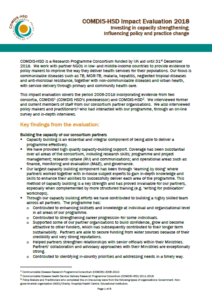
COMDIS-HSD Impact Evaluation 2018
This impact evaluation covers the period 2006-2018 incorporating evidence from two consortia, COMDIS (COMDIS HSD’s predecessor) and COMDIS-HSD. We interviewed former and current members of staff from our consortium partner organisations. We also interviewed policy makers and practitioners who had interacted with our programme, through an on-line survey and in-depth interviews.
PDF Version | HTML Version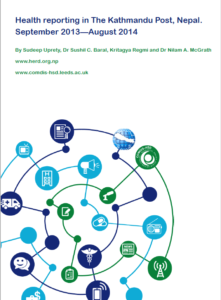
Health reporting in The Kathmandu Post, Nepal. September 2013-August 2014
The media are important actors in public health, yet there have been very few studies to date about what health issues are reported in Nepal. This learning paper analyses the discourse used by The Kathmandu Post when reporting on health issues over 12 months (Sept 2013 - August 2014). It highlights 4 themes that dominate how health is reported and recommends extending the research to encompass all English and Nepali language newspapers. It also recommends investing in training local journalists to access, check and interpret research evidence.
PDF Version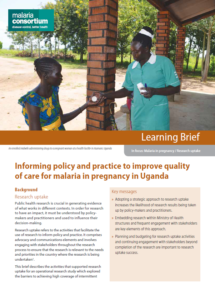
Informing policy and practice to improve quality of care for malaria in pregnancy in Uganda
How a small-scale study can inform policy and practice by providing robust and relevant research evidence to policy makers. This learning paper summarises the activities that supported research uptake in our study on the barriers to intermittent preventive treatment for malaria in pregnancy (IPTp).
PDF Version | HTML Version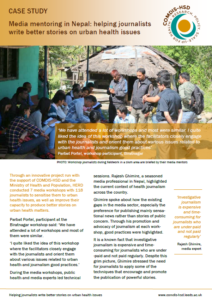
Media mentoring in Nepal: helping journalists write better stories on urban health issues
A case study describing our media mentoring exercise in Nepal where we helped more than 100 journalists improve their health reporting skills. Following sessions by expert tutors and field visits to local slum areas to understand the health issues faced by marginalised communities, several participants have gone on to win reporting awards.
PDF Version | HTML Version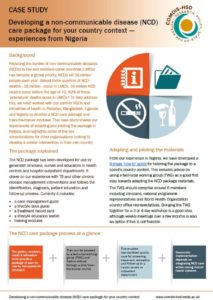
Developing a non-communicable disease (NCD) care package for your country context – experiences from Nigeria
Non-communiable diseases kill 38 million people each year. Almost three quarters of NCD deaths - 28 million - occur in low and middle income countries. To help address this, we have developed a NCD care package and train-the-trainer modules. This case study shares our experiences of adapting and piloting the package in Nigeria, and highlights some of the key considerations for other organisations looking to develop a similar intervention in their own country.
PDF Version | HTML Version
Making TB care more patient-centred in Pakistan and Nepal
Research shows that existing TB treatment strategies have led to patients experiencing unemployment, poverty and debt. Research by the Association for Social Development (ASD) in Pakistan and Health Research and Social Development Forum (HERD) in Nepal has led to effective, patient-friendly tuberculosis (TB) care delivery being adopted in both countries.
PDF Version | HTML Version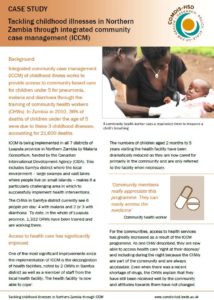
Tackling childhood illnesses in Northern Zambia through integrated community case management (ICCM)
This case study explores the significant improvements that integrated community case management (ICCM) has delivered in Luapula province in Northern Zambia; there is less congestion in health facilities and better access to care and medication for local communities. Key challenges are also highlighted, including the need for community health workers to have bicycles and torches in order to reach and care for rural communities more effectively.
PDF Version | HTML Version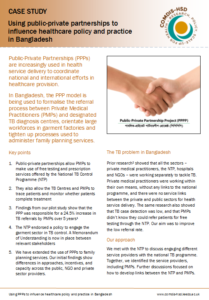
Using public-private partnerships to influence healthcare policy and practice in Bangladesh
A case study exploring how public-private partnerships are being used to formalise and improve the referral process between Private Medical Practitioners (PMPs) and TB diagnosis centres in Bangladesh. Not only is this model helping to significantly increase TB referral rates among large workforces in garment factories, it is now being scaled up to improve access to family planning services for urban poor populations.
PDF Version | HTML Version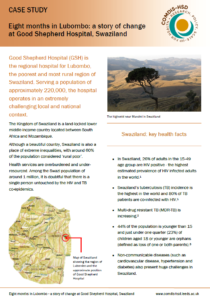
Eight months in Lubombo: a story of change at Good Shepherd Hospital, Swaziland
A case study by Dr James Elston reflecting on his time as COMDIS-HSD public health registrar at Good Shepherd Hospital. This personal account shows how he worked with hospital staff and in-country health leaders to renovate the TB ward and introduce a new HIV/TB screening programme for health workers.
PDF Version | HTML Version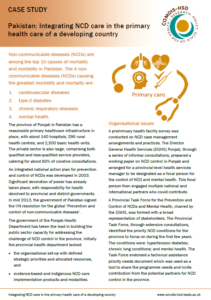
Pakistan: Integrating NCD care in the primary health care of a developing country
Non-communicable diseases (NCDs) are among the top 10 causes of mortality and morbidity in Pakistan. This is a case study presented by our Pakistan partners ASD at the WHO Regional Office for the Eastern Mediterranean meeting on strengthening the integration and management of non-communicable diseases in primary health care.
PDF Version | HTML Version

